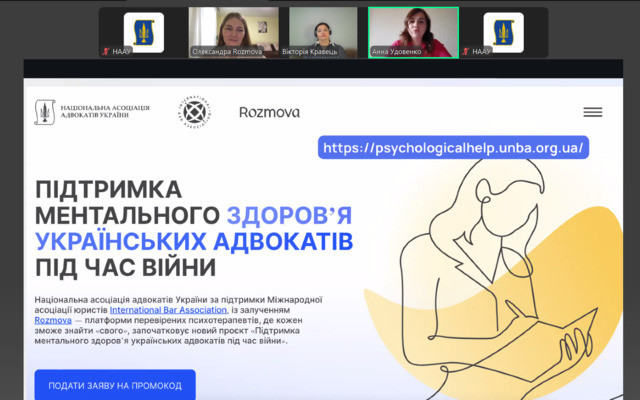
Advocates reminded: rest is a duty, not a reward

Is it possible to remain an effective professional while ignoring signs of fatigue? Can an advocate provide legal assistance without taking care of their own mental health? These questions were central to the webinar «Rest: laziness or necessity?».
The event took place on June 19 at the initiative of the Ukrainian National Bar Association and with the support of the International Bar Association (IBA) as part of the project «Supporting the Mental Health of Ukrainian Lawyers during the War».
Psychologist and Gestalt therapist Viktoria Kravets, who has been working with lawyers for a long time, shared her observations: most of us have an internal «dictator» who demands that we work to exhaustion and considers rest a sign of laziness or weakness. However, this is a misconception.
«Rest is not a reward, but a basic need. And fatigue is not a sign of laziness, but a natural signal from the body», - emphasized V. Kravets.
During the lecture, she debunked common myths: that it is shameful to rest, that you first have to «earn» a break, and that true professionals never stop. On the contrary, it is continuous work that leads to a loss of concentration, emotional stability, and a decrease in professional motivation.
Webinar participants had the opportunity not only to listen to the theory, but also to perform self-diagnostic exercises: how often they postpone rest, what exactly they associate with relaxation, and what internal prohibitions guide their decisions. Most recognized themselves as «typical modern people» — with a list of unfinished tasks, shame for moments of peace, and vacations with a laptop on their knees.
Particular attention was paid to the typology of rest — from physical and sensory to intellectual, emotional, social, and creative. It is equally important to take into account one's own temperament. What suits a choleric person will exhaust a melancholic, and a party that inspires a sanguine person may cause anxiety in a phlegmatic person.
«Rest is like food: it is important to know what «feeds» you. For some, it is silence and warmth. For others, it is movement, drive, and overcoming challenges. If rest does not restore you, it is not rest», - explained the speaker.
A separate section was devoted to the 80/20 principle: 20% of effort yields 80% of results. And recovery is one of those activities that ensures long-term effectiveness. The audience was advised to introduce microbreaks, mark «clean zones» without tasks in their calendars, and create their own «recovery box» — a list of simple actions and things that calm, nourish, and restore resources.
In the end, the main idea was that rest is not a pause in professional life, but a necessary part of it. For an advocate who works with trauma, makes responsible decisions, and faces the pain of clients every day, the ability to recover is not a whim, but a duty.
The mental health support project will continue. The next webinar topic «Sleep as a superpower» will focus on another key tool for self-preservation.
© 2025 Unba.org.ua Всі права захищені
"Національна Асоціація Адвокатів України". Передрук та інше використання матеріалів, що розміщені на даному веб-сайті дозволяється за умови посилання на джерело. Інтернет-видання та засоби масової інформації можуть використовувати матеріали сайту, розміщувати відео з офіційного веб-сайту Національної Асоціації Адвокатів України на власних веб-сторінках, за умови гіперпосилання на офіційний веб-сайт Національної Асоціації Адвокатів України. Заборонено передрук та використання матеріалів, у яких міститься посилання на інші інтернет-видання та засоби масової інформації. Матеріали позначені міткою "Реклама", публікуються на правах реклами.